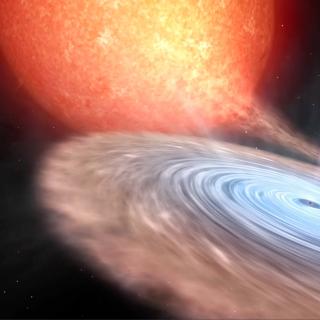Bibcode
Grisé, F.; Kaaret, P.; Corbel, S.; Cseh, D.; Feng, H.
Bibliographical reference
Monthly Notices of the Royal Astronomical Society, Volume 433, Issue 2, p.1023-1038
Advertised on:
8
2013
Citations
39
Refereed citations
39
Description
NGC 5408 X-1 is a well-studied ultraluminous X-ray source (ULX) that has
been seen to emit in X-rays persistently above the Eddington limit of a
stellar mass black hole for years. In this paper we report on the most
extensive X-ray monitoring of a ULX, using more than 4 yr of
observations from the Swift satellite. We find that the 115 d
periodicity reported by Strohmayer disappeared after only a few cycles,
confirming the suspicion of Foster et al. that the periodicity is most
likely superorbital and not the orbital period of the system. We also
report on a clear dipping behaviour of the source that may be related to
a (super)orbital phenomenon. All these features are reminiscent of
Galactic X-ray binaries and strengthen their link with ULXs. Deeper
observations of a dip could help resolve the ambiguity about the
interpretation of the spectral components of ULXs.
Related projects

Black holes, neutron stars, white dwarfs and their local environment
Accreting black-holes and neutron stars in X-ray binaries provide an ideal laboratory for exploring the physics of compact objects, yielding not only confirmation of the existence of stellar mass black holes via dynamical mass measurements, but also the best opportunity for probing high-gravity environments and the physics of accretion; the most
Montserrat
Armas Padilla